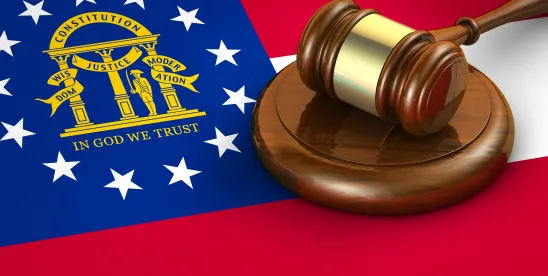On February 27, 2025, by a vote of 52 to 0, the Georgia Senate passed Senate Bill 69, titled “Georgia Courts Access and Consumer Protection Act.”
If signed into law, the bill would regulate third-party litigation financing (“TPLF”) practices in Georgia where an individual or entity provides financing to a party to a lawsuit in exchange for a right to receive payment contingent on the lawsuit’s outcome. This bill represents another effort by states to restrain the influence of third-party litigation financiers and increase transparency in litigations.
Senate Bill 69 sets forth several key requirements. First, a person or entity engaging in litigation funding in Georgia must register as a litigation financier with the Department of Banking and Finance and provide specified information, including any affiliation with foreign persons or principals. Such filings are public records subject to disclosure.
Second, the bill restricts the influence of a litigation financier in actions or proceedings where the financier provided funding. For example, a litigation financier cannot direct or make decisions regarding legal representation, expert witnesses, litigation strategy, or settlement, which are reserved only for the parties and their counsel. A litigation financier also cannot pay commissions or referral fees in exchange for a referral of a consumer to the financier, or otherwise accept payment for providing goods or services to a consumer.
Third, the bill renders discoverable the existence, terms, and conditions of a litigation financing agreement in the underlying lawsuit. Although mere disclosure of information about a litigation financing agreement does not make such information automatically admissible as evidence at trial, it opens the door to that possibility.
Fourth, the bill delineates specific requirements for the form of a litigation financing agreement and mandates certain disclosures about the consumer’s rights and the financier’s obligations. A financier’s violation of the bill’s provisions voids and renders unenforceable the litigation financing agreement. Willful violations of the bill’s provisions may even lead to a felony conviction, imprisonment, and a fine of up to $10,000.
Fifth, the bill holds a litigation financier “jointly and severally liable for any award or order imposing or assessing costs or monetary sanctions against a consumer arising from or relating to” an action or proceeding funded by the financier.
According to a Senate press release, Senate President Pro Tempore John F. Kennedy, who sponsored the legislation, lauded the Senate’s passage of the bill as enhancing transparency and protection for consumers. He commented that “[Georgia’s] civil justice system should not be treated as a lottery where litigation financiers can bet on the outcome of a case to get a piece of a plaintiff’s award” and that “SB 69 establishes critical safeguards for an industry that continues to expand each year.” He further stressed the need to “level the playing field and ensure that [Georgia’s] legal system serves the people—not powerful financial interests.” Since passing the Senate, the bill has also proceeded through the House First and Second Readers.
Georgia’s proposed legislation is largely in line with recent proposed or enacted TPLF legislation in other states. In October 2024, the New Jersey Senate Commerce Committee advanced Senate Bill 1475, which similarly requires registration by a consumer legal funding company, restricts the actions and influence of a consumer legal funding company, and mandates certain disclosures in a consumer legal funding contract, among other things. Indiana and Louisiana also enacted TPLF legislation codified respectively at Ind. Code §§ 24-12-11-1 to -5 (2024), and La. Stat. Ann. §§ 9:3580.1 to -.7 and 9.3580.11 to .13 (2024). West Virginia expanded its TPLF laws by enacting legislation codified at W. Va. Code §§ 46A-6N-1, -4, -6, -7, and -9 (2024). But different from these legislations, Georgia’s proposed legislation explicitly provides for the possibility of felony consequences for willful violations of its provisions.
TPLF has also reverberated at the federal level. In October 2024, the United States Supreme Court’s Advisory Committee on Civil Rules reportedly proposed to create a subcommittee to examine TPLF. H.R. 9922, the Litigation Transparency Act of 2024, was also introduced in the United States House of Representatives that same month and would require disclosure of TPLF in civil actions.
But while some argue that TPLF regulation would bring greater transparency and reduce frivolous litigation, others protest that such regulation would harm litigants with less resources. Either way, litigants would be well-served to monitor important developments regarding TPLF at both the state and federal levels.



 />i
/>i
